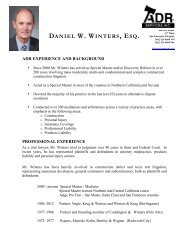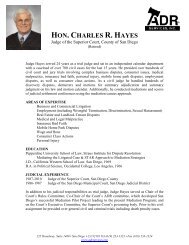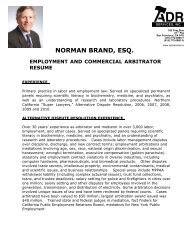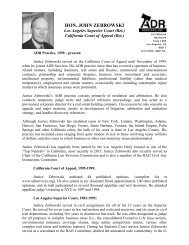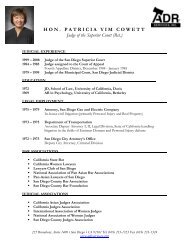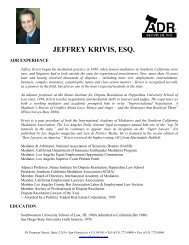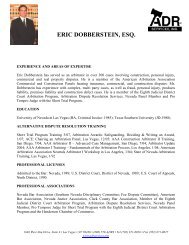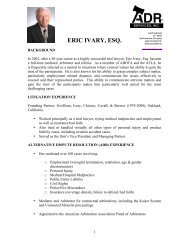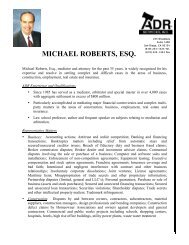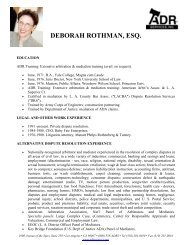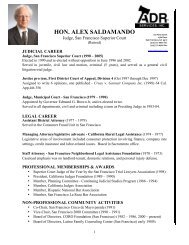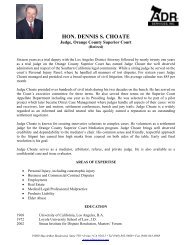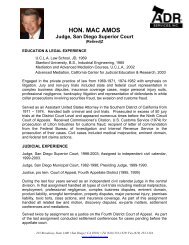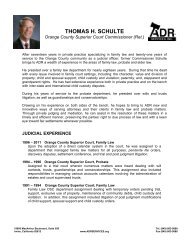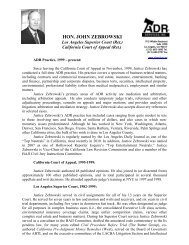Los Angeles Lawyer Article - ADR Services, Inc.
Los Angeles Lawyer Article - ADR Services, Inc.
Los Angeles Lawyer Article - ADR Services, Inc.
Create successful ePaper yourself
Turn your PDF publications into a flip-book with our unique Google optimized e-Paper software.
and (4) how much the testimony would contribute toward protecting<br />
those rights or advancing those interests—an inquiry<br />
that includes, among other things, an assessment of whether<br />
there are alternative sources of evidence of comparable probative<br />
value. 31<br />
Rinaker and Olam are applicable when 1) a party to a mediation<br />
settlement agreement, in which all of the parties have expressly waived<br />
mediation confidentiality, wants the mediator to testify as to what took<br />
place at the mediation, and 2) a due process violation might occur if<br />
mediation confidentiality were to prevent a mediator’s testimony.<br />
This year, Cassel v. Superior Court reaffirmed the scope of mediation<br />
confidentiality in California’s state courts. 35 The California Supreme<br />
Court was faced with two clear options—continue to hold that mediation<br />
confidentiality should be liberally construed despite the surrounding<br />
circumstances, or find that confidentiality should not be used<br />
to shield negligent attorneys from malpractice suits. The court chose<br />
to stay the course and held that mediation confidentiality has few<br />
exceptions.<br />
In Cassel, the plaintiff filed a complaint against his former attorneys<br />
for breaching their professional, fiduciary, and contractual<br />
duties. The plaintiff claimed that the defendants forced him to settle<br />
a case through the use of bad advice, deception, and coercion. To prove<br />
his case, Cassel wanted to introduce as evidence his conversations with<br />
his attorneys immediately preceding and at the mediation. The trial<br />
court ruled that these discussions were inadmissible. The court of<br />
appeal granted mandamus relief, reasoning that mediation confidentiality<br />
statutes are not intended to prevent a client from using communications<br />
with his or her lawyer outside the presence of all other<br />
mediation participants in a legal malpractice case against the lawyer.<br />
Cassel begins with a reminder that the legislature has provided only<br />
one exception to mediation confidentiality—an express waiver by the<br />
participants. Moreover, the judicially crafted exceptions are only<br />
available when “due process is implicated, or where literal construction<br />
would produce absurd results, thus clearly violating the<br />
Legislature’s presumed intent.” 36 The court reviewed Foxgate, Rojas,<br />
Fair, and Simmons—cases that, collectively, are authority for the broad<br />
application of mediation confidentiality. 37 With these decisions as a<br />
The court reasoned that the attorney-client privilege and mediation<br />
confidentiality statutes achieve separate and unrelated purposes.<br />
The former “allows the client to consult frankly with counsel on<br />
any matter, without fear that others” may use these confidences,<br />
whereas the latter “serve the public policy of encouraging the<br />
resolution of disputes by means short of litigation.”<br />
As the supreme court noted in Simmons v. Ghaderi, 32 parties<br />
seeking the trial court’s assistance in enforcing a settlement may<br />
avoid mediation confidentiality by expressly waiving its application.<br />
According to Evidence Code Section 1122(a)(1) and (2), a mediation<br />
writing is admissible if all participants agree to its disclosure and it<br />
does not reveal anything said or done during the mediation. To be<br />
valid, the waiver must be clear and unambiguous. Thus, a mediation<br />
settlement agreement should incorporate the language of Evidence<br />
Code Section 1123(a), (b) and (c) and state either that the agreement<br />
“provides that it is admissible or subject to disclosure…,” is “enforceable<br />
or binding…,” or “all parties to the agreement expressly agree<br />
in writing, or orally in accordance with Section 1118, to disclosure<br />
of the agreement.” 33<br />
Thus Foxgate and its progeny allow attorneys and mediators to<br />
report to the trial court the failure of an attorney or party to appear<br />
at a mediation. However, unless disclosure is permitted by consent<br />
of the parties or required to uphold a due process right, all communications<br />
during the mediation process, no matter how scurrilous or<br />
misleading, are confidential in California’s state courts—until the legislature<br />
states otherwise. 34<br />
The Impact of Cassel<br />
foundation for its ruling, the Cassel court held that the purpose of<br />
Evidence Code Section 1119(a)—which provides that “[n]o evidence<br />
of anything said or any admission made for the purpose of, in the<br />
course of, or pursuant to, a mediation…is admissible or subject to discovery…”—extends<br />
to all oral communications at a mediation, even<br />
if they only take place between parties and their own attorneys. 38<br />
The Cassel court also found that the plaintiff’s discussions with<br />
his attorneys before the mediation concerning mediation strategy and<br />
settlement were confidential because Section 1119(a) and (b) applies<br />
to all utterances and writings “for the purpose of, in the course of,<br />
or pursuant to, a mediation.” Instead of attempting to create a<br />
bright-line test for establishing when a pre- or post-mediation utterance<br />
or writing is related to mediation and thus confidential, the court<br />
simply held that the plaintiff’s discussions with his attorneys came<br />
within the statute because they “concerned the settlement strategy to<br />
be pursued at an immediately pending mediation…[and] were closely<br />
related to the mediation in time, context, and subject matter.…” 39<br />
The court in Cassel notes that the mediation confidentiality<br />
statutes are unlike Evidence Code Section 958—which eliminates confidentiality<br />
protections otherwise afforded by the attorney-client<br />
privilege in suits between clients and their lawyers—because the<br />
mediation confidentiality statutes contain no exception for legal malpractice<br />
actions. The court reasoned that the attorney-client privilege<br />
and mediation confidentiality statutes achieve separate and unrelated<br />
purposes. The former “allows the client to consult frankly<br />
with counsel on any matter, without fear that others” may use these<br />
confidences, whereas the latter “serve the public policy of encouraging<br />
the resolution of disputes by means short of litigation.” 40<br />
The Cassel court also discussed the nonapplicability of the due<br />
process exception and the more general “absurd result” test to the<br />
facts before it. Due process was not a factor because “the mere loss<br />
of evidence” in a lawsuit for civil damages does not implicate a fundamental<br />
interest. Nor did the result produced by applying the plain<br />
terms of the statutes to the facts of the case create a result that was<br />
absurd or clearly contrary to legislative intent. 41<br />
In sum, the Cassel court reversed the appellate court judgment and<br />
left the plaintiff with the inability to introduce evidence of his attorneys’<br />
alleged misconduct immediately prior to and at the mediation.<br />
The short-term impact of Cassell’s extensive analysis should foreclose<br />
20 <strong>Los</strong> <strong>Angeles</strong> <strong>Lawyer</strong> December 2011



